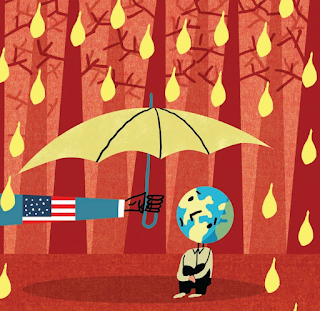Addressing Climate Injustice: Time for High-Polluting Nations to Pay Reparations
Amidst the deepening climate crisis, the summer of last year brought a stark reminder—pollution transcends borders. Smoke from Canadian wildfires reached the United States, impacting air quality and prompting health warnings. Greenhouse gas pollution, much like wildfires, knows no borders, indiscriminately warming the planet on a broad scale. As richer nations' decades-long carbon pollution magnifies natural disasters, it is the poorer countries that bear the heaviest burden.
In response to this, the United Nations took a crucial step at COP27 in November 2022. World leaders agreed to establish a fund for loss and damages caused by climate disasters, recognizing the urgent need for reparations. However, the road to making these reparations a reality is challenging, given the slow pace of climate diplomacy.
The United States, alongside other high-polluting nations, must take responsibility and pursue climate reparations. The science is unequivocal—wealthier nations, particularly the U.S., have contributed significantly to the production of heat-trapping gases, with the U.S. alone responsible for 17 percent of the global total. While industrialized countries pledge funds for climate change mitigation and adaptation, the promised $100 billion per year has yet to materialize.
The consequences of carbon pollution are already dire, leading to disasters like the unprecedented storm in Libya that claimed thousands of lives. Scientists link such calamities to the impact of climate change, emphasizing that the delay in addressing the issue has accepted the human cost and global harm. The toll of climate-related disasters is steepening, with Earth experiencing about 40 billion-dollar disasters in 2022 alone.
As the climate crisis intensifies, it becomes increasingly evident that the responsibility lies with the industrialized world. The urgent call is to prioritize the needs of developing countries and those most affected by the climate emergency. There is no time to wait, and the least industrialized nations can do is pay for the damage they have inflicted.
Frequently Asked Questions (FAQ):
What did the United Nations decide at COP27 regarding climate reparations?
- World leaders at COP27 agreed to establish a fund for loss and damages caused by climate disasters, recognizing the need for reparations.
Why is the U.S. and other high-polluting nations urged to pursue climate reparations?
- Wealthier nations, particularly the U.S., have significantly contributed to the production of heat-trapping gases, and fulfilling reparations is seen as taking responsibility for this impact.
What are some consequences of carbon pollution mentioned in the article?
- The article highlights disasters such as the unprecedented storm in Libya and the increasing toll of billion-dollar disasters worldwide.
Why is there urgency in addressing climate reparations?
- The urgency stems from the escalating climate crisis and the acknowledgment that industrialized nations are responsible for the damage caused.
What is the role of the industrialized world in addressing the climate crisis?
- The industrialized world is urged to prioritize the needs of developing countries and those most affected by the climate emergency.
Article for Environmental Activists and Concerned Citizens:
Amidst the escalating climate crisis, the call for high-polluting nations, including the U.S., to pay reparations has never been more urgent. The United Nations, recognizing the severity of the situation, took a crucial step at COP27, agreeing to establish a fund for loss and damages caused by climate disasters.
The responsibility lies squarely on wealthier nations that have significantly contributed to heat-trapping gases, with the U.S. alone responsible for 17 percent of the global total. Despite pledges for funds to address climate change, the promised $100 billion per year has yet to materialize, leaving developing nations grappling with the consequences of carbon pollution.
The consequences are dire, with unprecedented storms and a rising toll of billion-dollar disasters. The urgency is clear—the industrialized world must prioritize the needs of developing countries and those most affected by the climate emergency. There is no time to wait, and it is imperative that reparations are made for the damage caused.
#ClimateInjustice, #ReparationsNow, #ClimateAction, #GlobalResponsibility, #EnvironmentalJustice

